
How to Reduce CRM Costs Without Sacrificing Performance
Managing a Customer Relationship Management (CRM) system is vital for businesses aiming to build meaningful connections with their customers. However, the rising costs of these systems, coupled with unclear returns on investment, often lead to frustration. Businesses face the dual challenge of maintaining a robust CRM system while controlling expenses. But is it possible to reduce CRM costs without affecting performance? Let’s explore practical solutions to address this concern while maximizing ROI from your CRM system.
Understanding the CRM Cost Dilemma
There are many reasons why CRM systems can get costly. Licensing fees, customization needs, third-party integrations, and employee training can increase costs. For small and medium-sized businesses, these expenses can appear disproportionate to the services received.
The unclear ROI is also a big issue. Sometimes businesses spend money on CRM tools but fail to implement them within measurable frameworks. This disconnect can result in decision-makers wondering whether the investment was worth it.
To reduce CRM costs, businesses must rethink their approach. By focusing on strategies that align cost-efficiency with performance, organizations can leverage affordable CRM solutions to meet their needs without breaking the bank.
Strategies to Reduce CRM Costs
Reducing CRM expenses doesn’t mean compromising on its effectiveness. The right strategies can help businesses cut costs while maintaining robust functionality.
Audit and Optimize Usage
Start by analyzing how your current CRM system is being used. Often, businesses pay for features that are underutilized or unused altogether. Streamline your CRM by removing unnecessary tools, features, or user accounts to reduce costs without affecting operations.
Adopt Cloud-Based Solutions
Switching to a cloud-based CRM can significantly reduce infrastructure and maintenance expenses. These solutions often come with flexible pricing plans, allowing businesses to pay only for what they use.
Leverage Open-Source Options
For businesses looking for affordable CRM solutions, open-source systems can be a cost-effective alternative. They offer customizable features while eliminating hefty licensing fees.
Automate Repetitive Tasks
Automation tools integrated within CRM systems can reduce manual workloads, improve efficiency, and minimize errors. This not only lowers operational costs but also enhances overall productivity.
Improving CRM ROI
Reducing costs is only one part of the equation. To truly maximize ROI from your CRM system, businesses need to ensure it’s being utilized effectively.
Track Key Metrics
You can tell how well a CRM is performing by measuring the previously established success metrics. Data analysis should also highlight areas of particular strength and areas that can be improved. Customer retention rates, sales growth, and response times are some of the metrics that can be very informative.
Employee Training and Adoption
Implementing a CRM system is as effective as the staff that are going to use it. Make sure to invest in training properly so that staff understand how to use the system. Staff that have been trained properly will be able to utilize CRM features more effectively leading to better customer satisfaction and better returns.
Focus on Customer Experience
A CRM system is highly efficient when customers are active and willing to cooperate. Providing personal interaction, handling and resolving issues in a timely manner and consistently providing follow up activity increases customer retention which grows ROI.
Choosing the Right CRM Solution
It is important to choose the right CRM to ensure that the performance and monetary demands are adequately met. Many systems exist and businesses should be able to sift through them in order to get a suiable one.
Assess Cost vs. Features
Pick a CRM system which has key functionalities but is not too expensive. Stay away from systems with advanced features which are not needed by your particular business, as they can lead to higher costs.
Opt for Scalable Options
A CRM should be able to grow with your business. Scalable solutions allow you to add features or expand capacity as needed, preventing the need for costly migrations in the future.
Take Advantage of Free Trials
Many CRM vendors offer trial periods or demo versions of their products. Use these opportunities to evaluate whether a particular system meets your requirements before committing to a purchase.
Conclusion
Reducing CRM costs doesn’t have to come at the expense of performance. By auditing your current system, exploring affordable CRM solutions, and focusing on improving ROI, businesses can strike the perfect balance between cost-efficiency and effectiveness.
To achieve the best results, it’s essential to adopt a strategic approach that aligns CRM usage with your organization’s objectives. Partnering with experts like Manras, a trusted Salesforce-certified consultant, can further streamline this process by providing tailored solutions to reduce CRM costs and improve ROI.
For more insights, updates, and expert tips, follow us on LinkedIn.


